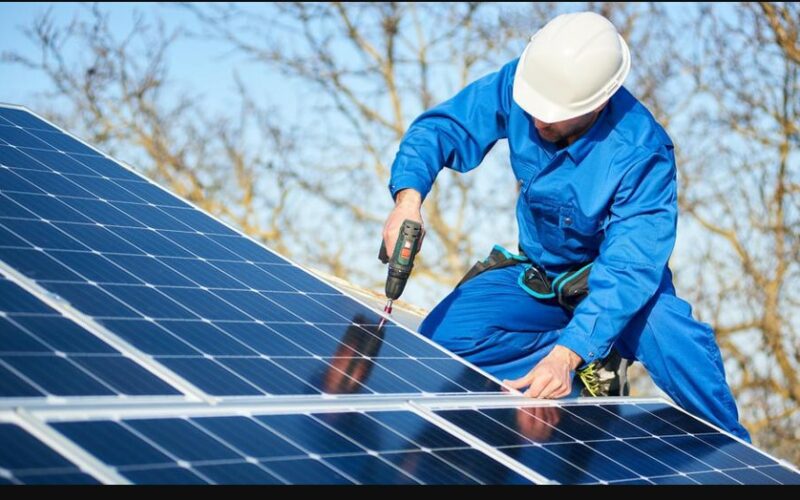The Benefits of Installing Solar Panels for Your Home: Solar panels are an environmentally friendly way to power your home. It’s a great way to cut down on your carbon footprint while also reducing your utility bills.
Before installing a solar panel system, it’s important to figure out how much energy you consume on a monthly or yearly basis. This will allow you to accurately determine how many solar panels you’ll need for your home. How to Find a Trustworthy Solar Installer
Table of Contents
Cost-effectiveness
Solar panels are one of the most affordable and environmentally friendly ways to power your home. In addition to generating free energy, they also increase the value of your home and lower your electricity bill.
The cost of installing a solar panel system depends on your location and the size of your home. However, the overall cost can be reduced by federal and state tax incentives.
For example, homeowners in the United States can deduct up to 26 percent of the cost of solar panels through an investment tax credit. These savings can add up to more than 50 percent of the initial cost of your system, according to the Clean Energy Resource Center.
In addition, some utilities offer rebates for solar energy. This will lower your installation costs even more.
Another way to save money on your electric bills is to install a battery backup for extra energy. Using these batteries will allow you to run your home during cloudy or dark days, when solar isn’t able to generate enough power.
Adding a battery to your solar system will add at least $10,000 to the cost of the installation, but it’s well worth it for reducing your monthly utility bills.
You’ll also be able to sell some of the extra energy back to your local utility provider, which will help reduce your electricity bill. Depending on your local utility, you may also qualify for a solar battery incentive.
If you’re considering installing a solar panel system, it’s important to do your research. You’ll want to find a reputable, experienced company that has a reputation for quality.
A good installer should be able to provide you with a complete breakdown of costs and ensure that you get the most out of your investment. They should also be able to answer any questions you have along the way.
The amount of energy your system produces will depend on your home’s location, the number of sunlight hours you receive, and the type of roof you have. The SolarReviews calculator can help you estimate the system’s output based on your home and climate.
Environmentally friendly
Solar energy has many environmental benefits that make it a great option for home use. Its clean and renewable nature helps lower greenhouse gas emissions and reduce harmful air pollutants that cause health problems.
The process of generating electricity using nonrenewable sources like coal and natural gas emits hazardous air pollutants into the atmosphere, including dangerous greenhouse gases and ground-level ozone that can lead to asthma and other respiratory diseases. These pollutions have serious effects on our ecosystem and the planet’s climate.
Another environmental benefit of solar energy is that it doesn’t require a lot of water to generate electricity. Coal and natural gas power plants require about 60,000 gallons of water per megawatt-hour (MWh) of electricity produced, whereas a solar system only uses around 300 gallons of water to produce the same amount of electricity.
It also helps to eliminate the need for expensive, polluting fossil fuels. Electricity generated by traditional, nonrenewable sources like coal and natural gas-fired power plants can cost tens of thousands of dollars, whereas the same electricity made by a solar panel costs a fraction of that.
Even though solar panels have a high upfront cost, they quickly pay for themselves in eight years or more on average. This is due to the fact that solar energy has a high return on investment, and it’s a reliable, inexpensive source of energy.
In addition to lowering your energy bill, you can offset some of your utility bills by selling the excess energy you produce to your local power company. This is especially beneficial for customers who live in areas that don’t get as much sun as they would like to during certain times of the year.
If you’re a homeowner or renter, installing solar panels can be a cost-effective way to lower your energy bill and increase the value of your home. In addition, you can take advantage of federal and state tax incentives to help cover some of the costs.
Besides being environmentally friendly, solar panels are one of the most convenient forms of renewable energy available. They are lightweight, easy to install, and can be used almost anywhere. They are also extremely affordable, making them an attractive option for homeowners and business owners alike.
Increased home value
Solar panel systems can significantly increase your home value, especially if you’re planning to sell it in the near future. They make your home more energy-efficient, which is attractive to future homeowners who will also be saving money on their monthly electricity bills.
Homes with solar panels often sell faster than those without. This is due to the fact that many people are becoming more eco-conscious and want to reduce their household costs.
The National Renewable Energy Laboratory (NREL) says that a system that saves a homeowner $400 per year in utility expenses will add up to about $8,000 of extra value to the home. NREL cites an Appraisal Journal study that found that home values increased by $10 to $25 for every $1 that homeowners saved on their energy bills.
Similarly, a Zillow study showed that homes with solar-energy systems sold for an average of 4.1% more than similar homes that did not feature such technology. This was true for every state in which Zillow analyzed the data.
In addition to adding significant value to your property, solar panels are also environmentally friendly and help protect the environment from environmental degradation. In some cases, they even help you avoid costly carbon emissions.
According to a study published in the Appraisal Journal, adding a solar system to your home will increase its resale value by $20 for every dollar it saves you on utility bills. This means that a solar system that saves you $400 each year will increase your home’s resale value by $8,000.
If you plan to sell your home, it is important to keep your solar system in good working condition and update any outdated parts. You can do this by ensuring that your home has up-to-date wiring, electrical outlets, and lighting.
You can also increase the resale value of your solar power system by adding a battery to store excess solar energy. These batteries are expensive, but they can allow you to run your home without relying on the utility company for electricity when your panels aren’t producing enough.
Tax incentives
If you’re thinking of going solar, you’ll be happy to know that there are several government incentives available. They include rebates, tax credits, and subsidies that can dramatically lower the cost of installing a solar system for your home.
The most well-known of these is the Federal Investment Tax Credit, or ITC. This incentive can be claimed as part of your yearly federal income tax return for up to 30% of the gross cost of your solar installation.
However, you must make sure that you’re eligible for this incentive before filing your taxes. This includes ensuring that you’re a homeowner and owning the panels you install. It also means that you’re not a leaser or using a power purchase agreement (PPA).
Another great way to save on the upfront costs of solar is through the NY-Sun program. This program works with solar contractors to help homeowners qualify for incentives and financing.
This program has been credited for spurring New York state’s massive growth in solar installations, with over two gigawatts installed so far and on course to reach six gigawatts by 2025. It offers many benefits, including solar rebates of up to $1,200 per kW on systems under 25 kilowatts (kW) and on-bill recovery loans for up to $25,000, which let you pay for your solar installation bit by bit on your monthly utility bill.
In addition to the ITC, New York also has other solar incentives, like the Home Solar Project Sales Tax Exemption. These incentives can reduce the installation cost of your solar system by almost 4%.
These incentives are available through a variety of sources, including the state, the Department of Energy, and solar companies that sell energy to your utility company. They’re typically only offered for a limited time, so it’s important to check with your local government before you begin your solar installation.
For those looking to go solar without the up-front costs, there are also community solar farms. These aren’t as expensive as traditional rooftop solar because you “subscribe” to a share of the solar power that’s produced by the farm.









